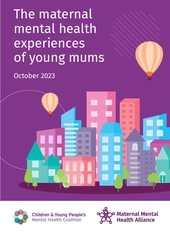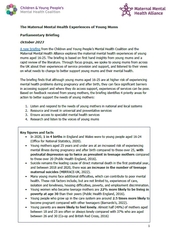Historically, much of the conversation around young motherhood has focused on preventing teenage pregnancies, and as a result, little attention has been paid to the needs of young parents. The Maternal Mental Health Alliance (MMHA) and the Children and Young People’s Mental Health Coalition (CYPMHC) have long been concerned that little is known about the experiences of young mums, despite being identified as a group at high risk of developing mental health problems.
Our joint report, ‘The maternal mental health experiences of young mums’, explores the mental health experiences of young mums and sets out what needs to change to better support young mums and their mental health. To do this, we carried out a rapid literature review and spoke to 20 young mums from across the UK to listen to their experiences of care and their views on what needs to change.
They tell you, not help you.
We know that girls and young women are already a high-risk group for developing mental health problems – data suggests that 31% of young women aged 17 to 24 have a mental health problem compared to young men of the same age. This risk can increase during pregnancy and following childbirth, and sadly suicide remains the leading cause of direct maternal death in the first postnatal year.
Young mothers aged 25 and under have been identified as being at particularly high risk of experiencing mental illness in the perinatal period, with postnatal depression up to twice as prevalent in teenage mothers compared to those over 20. The MBRRACE report has also highlighted an increase in teenage maternal suicide in recent years.
Becoming a parent is challenging at any age, but many young mums face additional difficulties in their lives which contribute to poor mental health and compound the challenges they may be facing. Through our research, we found that many young mums experience loneliness and isolation, face employment discrimination, and have challenges re-engaging with education. What is more, many of the issues young mums face are financial and living in poverty is a reality for many – it has been identified that women who became teenage mothers are 22% more likely to be living in poverty at age 30 than their peers.
As a young mum, you do feel judged a lot.
Young mums can access support from a wide range of services, including GPs, health visitors and from mental health services. However, for many, stigma clouded their experiences of services. Young mums we spoke to told us how they often felt judged by the services they come into contact with for being a young parent and felt that concerns about their health and their child’s health were not taken seriously as a result.
In contrast, where young mums had received specific support from a dedicated service for young mums, they said they felt understood and supported, and that opportunities were provided for them to connect with young people in a similar situation.
The support young mums would like to receive can be broadly split into two areas: emotional and practical. The emotional element focuses on young mums wanting to feel valued as a parent and shown that their opinions and experiences matter. Acknowledging when young mums are ‘doing it right’ is empowering as well as providing guidance on any areas of improvement, this means healthcare professionals walk alongside young mums and not helicopter parent their parenting.
The practical element focuses on ‘follow up and checking in, doing the things you say you will do, follow up on housing, follow up on appointments.’ Having some flexibility in how and when services can be delivered would help especially when relying on public transport. This will enable young mums to feel seen and heard – they want to be taken seriously.
A dream city would have a GP that doesn’t threaten to send social services to your door for opening up when you are struggling, because that is the main reason a lot of young mums are struggling with their mental health because they are afraid of losing their kids.
Firstly, we must listen and respond to the needs of young mums. For too long their voices have been ignored. Their needs must be considered within service and policy design at both a national and local level.
Secondly, investment in universal and preventive services is required. Where young mums felt most valued, was when they received support tailored for them. Yet many services delivering support have faced significant financial pressures in recent years.
Many girls and women are also unable to access support from NHS specialist mental health services due to a lack of capacity in the system. The Maternal Mental Health Alliance estimate that between January and December 2021, over 16,000 women in need of support from perinatal services were not able to access specialist care. It is crucial that specialist services receive sufficient funding and resource to ensure all girls and women can access the support they need.
Read policy recommendationsI think the actual maternity staff within the birthing unit postnatal and antenatal need to be trained in mental health because that’s where my mental health spiralled…I just assumed that these people were trained in that.
Finally, if a single word had to be chosen from this report which impacts experiences and services, it is ‘stigma.’ This was repeated numerous times and truly changed what the young mums shared, and consequently which services were accessed.
The young mums highlighted that having someone to advocate on their behalf, if needed, was important however – this is a delicate space and will need clear communication. The aim would be to support and empower not to disempower. The way to get to this point is by building rapport and demonstrating trust and understanding. This could simply be by giving examples of how you have worked with young mums before and share the different positive outcomes.
Any assumptions need to be left at the door and the language cannot be judgemental as both will impact experiences and access to services. At every touchpoint with a young mum, there is a moment of opportunity to support, and the evidence is telling us that the longer we do nothing the longer the suffering. This along with the stigma is unnecessary and avoidable.
We need to be mindful that the timing of the pregnancy and caregiving for young mums can often coincide with their education. The inclusion of education support was highlighted and the young mums want to continue learning AND be a parent so are seeking support to make this happen.
Somebody that understands and is there to listen to you.
For too long, young mums’ needs and views have been ignored. It is time their experiences were listened to, and their needs centred in the planning of perinatal mental health support.

CYPMHC X MMHA Pdf, 1.7mb
Published: October 2023
This joint briefing by the Maternal Mental Health Alliance and the Children and Young People’s Mental Health Coalition explores the maternal mental health experiences of young mums aged 16-25. We gathered first-hand insights from young mums and conducted a rapid review of relevant literature.

CYPMHC X MMHA Pdf, 191.4kb
Published: October 2023
Support for young mums aged 16-25 has been notably absent from the policy agenda in recent years. Whilst efforts have been focused on reducing the number of teenage pregnancies, less attention has been paid to the support needs of young mums and historically young parenthood has been framed as a problem.